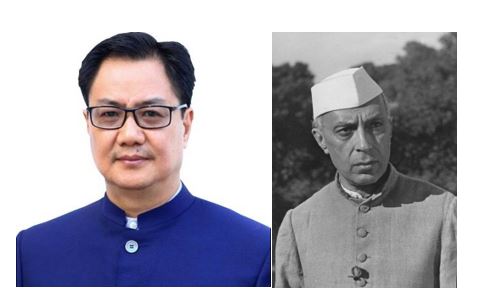By Kiren Rijiju :There are two ways to look at the significance of 27 October. The first is to mark it as the 75th anniversary of Jammu and Kashmir’s accession to India through the instrument of accession. Historically, this is correct. However, there is another, far more contextual and accurate way to look at this date. October 27 is the 75th anniversary of an important day in a series of Jawaharlal Nehru’s greatest blunders, both before and after this date, that haunted India for the next seven decades.
When India was being partitioned in 1947, the principle of partition only applied to British India. The princely states were free to choose any of the two new dominions about to be created – India and Pakistan. There was no provision for any consultation with the people of the princely states. All matters relating to accession were to be decided only between the ruler of the princely states and the leaders of the respective dominions.
Birthing a united, geographically contiguous state representing an ancient nation required unflinching grit, determination and foresight. Accordingly, Sardar Patel, the Iron Man of India, was chosen for the task. There were 560-odd such princely states. All were integrated with India before August 15, 1947. Two princely states created problems – Hyderabad and Junagarh. But Sardar Patel out-maneuvered them both, using his exemplary skills of persuasion, tact and willingness to use force if required.
A historical lie has been perpetrated for the past seven decades that Kashmir was also among the princely states that created problems and Maharaja Hari Singh, the then ruler of the state, was dilly-dallying on joining India. As documents now reveal, it was Nehru who, in order to fulfil his personal agenda, created these problems and not the Maharaja.
In a speech delivered in Lok Sabha on July 24, 1952, Nehru himself conceded the facts. Maharaja Hari Singh, like all other princely states wanting to join India, had approached Indian leadership in July 1947 itself for accession. A full month before India’s actual Independence. In Nehru’s own words, the question of accession “came up before us informally round about July or the middle of July”. Nehru goes on to further state that “we had contacts with the popular organization there, the National Conference, and its leaders, and we had contacts with the Maharaja’s Government also”.
The First Nehruvian Blunder on Kashmir, in a series of blunders, is revealed as a clincher in the same speech. Nehru states “the advice we gave to both was that Kashmir is a special case and it would not be right or proper to try to rush things there”.
But what is it that Nehru wanted? Who better than Nehru himself to answer? In the same 1952 speech, he further states “even if the Maharaja and his Government then wanted to accede to India, we would like something much more, that is, popular approval”.
There was no requirement to seek popular approval of the people of princely states as per the Indian Independence India Act. All that mattered was the willingness of the ruler to join the Indian union. That is exactly what the other princely states did.
Kashmir has been one of the epicentres of Indian civilizational consciousness since time immemorial. At the time of partition, the ruler of Kashmir wanted to unite with the rest of India without conditions. The man who rejected the union was Nehru. And for what? The popular approval bogey was invented by Nehru for Kashmir because it was a ‘special case‘. What was special about Kashmir that in Nehru’s mind did not make it an automatic, non-negotiable candidate to join India?
Nehru’s blunders though did not stop at just his July 1947 perfidy. Despite the bloodshed and violence witnessed post-partition, Nehru remained adamant about getting his personal agenda fulfilled before Kashmir’s accession.
The vacuum that Nehru created in Kashmir allowed Pakistan to meddle in Kashmir and ultimately its forces, in the guise of local tribals, invaded the territory of Kashmir on October 20, 1947. Even then Nehru was unmoved. Pakistani forces were rapidly advancing in Kashmir. Maharaja Hari Singh again pleaded with Nehru to join the Indian union. But Nehru was still negotiating to fulfil his personal agenda.
October 21, 1947, a day after the Pakistani invasion had started, Nehru advised Jammu and Kashmir’s Prime Minister, MC Mahajan, through a letter that “it will probably be undesirable to make any declaration of adhesion to the Indian Union at this stage”.
But what was it that Nehru so desperately wanted that not even an invasion moved him? Finally, in the same letter to MC Mahajan, Nehru revealed his desire in writing and so we can count on Nehru’s own words rather than hearsay. “I suggested to you the urgency of taking some steps like the formation of a provisional government. Sheikh Abdullah, who is obviously the most popular person in Kashmir, might be asked to form such a government”.
Installing Sheikh Abdullah, his friend, in power was more important to Nehru than integrating Kashmir irrevocably with India. It is exactly the same demand that Nehru had placed in July 1947 as well when Maharaja Hari Singh had first approached Nehru to join India. The deal could have been done then itself, and the chapter closed, forever, if Nehru had forsaken his personal agenda and thought only of India First.
But as Nehru kept delaying the accession even at that late hour, the Pakistani forces continued to advance, occupying Gilgit, Baltistan and Muzaffarabad. They plundered and ravaged the territories along the way and were finally within sight of Srinagar around October 25-26, 1947. Even at this stage, when the Maharaja had unilaterally signed the instrument of accession, Nehru was still waffling.
In the speech in Lok Sabha in 1952, Nehru records even this day and to quote him, “I remember, it must have been the 27th of October, after practically an all-day sitting in the evening we came to the conclusion that in spite of all the risks and dangers involved, we could not say ‘No’ to the appeal”.
As late as October 26, 1947, with Pakistani forces knocking on the gates of Srinagar, Nehru was still juxtaposing his personal agenda with what his national data demanded.
Finally, the instrument of accession was accepted on October 27, 1947 and the Indian forces landed in Kashmir and started repelling the Pakistani invaders.
The entire Kashmir history could have been so different. The matter of accession could have ended in July 1947 itself.
With the issue of accession settled (unlike the limbo that actually existed), there would have been no Pakistani invasion, no Pakistan Occupied Jammu and Kashmir (PoJK), no reference to the United Nations, no locus for Pakistan to fight the wars on Kashmir in later decades, no jihadi terrorism and no uprooting of Kashmiri Hindus in 1990. As late as 21st October 1947, if Nehru had acted in time, there would still be no PoJK.
But Nehru’s blunders don’t stop in just October 1947.
The Second Nehruvian Blunder on Kashmir was declaring the eventual accession as provisional. Maharaja Hari Singh signed exactly the same instrument of accession as every other princely state. All other princely states were unambiguously integrated into the union, except Kashmir. Why? Because it was Nehru himself, not the Maharaja, who declared the accession provisional.
On October 26, Nehru wrote another letter to MC Mahajan where he stated: “The Government of India will accept this accession provisionally subject to the declared policy that such matters should be finalised in accordance with the will of the people”.
It is the declaration of provisional accession, by Nehru and not by the Maharaja, that then started a chain of events that eventually led to the belief that Kashmir was somehow different, that its accession was open to debate or that any other possibility except permanent integration with India was even an option. If not in July 1947, then on October 27, 1947, Nehru was presented with another chance to permanently close the question of Kashmir’s accession. But Nehru’s blunders opened a door that seeded seven decades of doubts, separatist mindset and bloodshed.
The Third Nehruvian Blunder on Kashmir was to approach the United Nations on January 1, 1948, under Article 35 which deals with disputed lands rather than Article 51 which would have been the correct article to highlight Pakistan’s illegal occupation of Indian territory. The Maharaja signed only one instrument of accession – that with India. Yet, it was Nehru who gave a locus to Pakistan by himself accepting Kashmir as a dispute between India and Pakistan. Since then, the UN resolutions have continued to haunt India.
The Fourth Nehruvian Blunder on Kashmir was to let the myth perpetrate that a UN-mandated plebiscite in Kashmir was being stopped by India. The August 13, 1948 United Nations Commission for India and Pakistan (UNCIP) resolution had three conditions in sequential order. First, ceasefire. Second, withdrawal of troops by Pakistan and third, plebiscite. Part III was contingent on Parts I and II being fulfilled. Ceasefire came into effect on January 1, 1949. But Pakistan refused to withdraw its troops from occupied territories.
Therefore, on December 23, 1948, the UNCIP concurred with Indian aide memoir (Indian letter to UNCIP seeking clarification) that Part III was not binding in absence of Part I and Part II being fulfilled. This was further confirmed by the UNCIP in a resolution on January 5, 1949. Therefore, UNCIP itself accepted that any talk of the plebiscite as per its resolution was infructuous due to Pakistan not fulfilling Part II of the UNCIP resolution. And yet, the sword of plebiscite keeps hanging on India. Why? Because Nehru himself had opened that door!
The Fifth Nehruvian Blunder on Kashmir was, of course, the creation and perpetuation of Article 370 (Article 306A in the interim draft of the Constitution). In the first instance, there was no justification for such an article as the instrument of accession was the same as every other princely state signed. The only ‘special’ case that existed was in Nehru’s mind.
Indeed, Maulana Hasrat Mohani, a Muslim representative from United Provinces, asked as much in the Constituent Assembly debates. On October 17, 1949, Maulana Mohani specifically asked: “Why do you make this discrimination about this ruler?”
Neither Nehru nor N Gopalaswamy Ayyangar, Nehru’s point man on dealing with Sheikh Abdullah and the person who shepherded the divisive Article 370 (then 306A), had any answers to this question. Nehru had his way and Article 370 came into existence, thereby institutionalizing the separatist mindset that hung like a noose around India’s neck.
Seven decades passed since those tumultuous years. India has since paid a heavy price for Nehru putting family, friendship and personal agendas above national interest. The world got a lever to pin India down. Pakistan handed over part of its occupied territory to China. Jihadi terrorism started in the 1980s. Kashmiri Hindus were driven out of their ancestral lands and made refugees in their own country. Terrorism killed thousands of Indian men, women and children. Soldiers from all parts of India sacrificed their lives in the service of the motherland. It could have all been so different…
Seven decades and generations of opportunities have been lost due to blunders of one man. However, seven decades later, history took another turn on August 5, 2019. Unlike in 1947, India First was the only guiding principle of the New India being built by Prime Minister Narendra Modi. And so, PM Modi finally undid the series of blunders that have hobbled India since 1947. Article 370 was annulled, the Indian Constitution was applied to the entire erstwhile territory of Jammu and Kashmir, people of Ladakh were given justice by creation of a separate Union territory and the process of full integration and healing began in right earnest.
The sources used for quoting various people in the above article are:
- Nehru’s 24th July 1952 Speech in Lok Sabha where he admits he was still dithering as late as 26th October 1947 on accepting Kashmir in India.
- Selected Works of Jawaharlal Nehru. Series 2, Vol. 4. August 1947-December 1947
- Letter dated 10/01/1949 from the Chairman and Rapporteur of the United Nations Commission for India and Pakistan addressed to the Secretary-General transmitting the 2nd interim report of the Commission.
-
- Constituent Assembly Debates. October 17, 1949
(The author is Union Law Minister. Views expressed are personal.)@FP

Readers like you, make ESHADOOT work possible. We need your support to deliver quality and positive news about India and Indian diaspora - and to keep it open for everyone. Your support is essential to continue our efforts. Every contribution, however big or small, is so valuable for our future.












Nehru was a great man and helped form new India which we are seeing now.Naturally mistakes are possible by any one and same apply for Nehru ji. I remember seeing him in Amritar . every one went to see him. please remember what ever we are seeing the development in India It is due to him and his administration . He was a great leader. we all should learn to give respect to our great leaders of the past.Present leaders got to learn this fact and show their work instead of sweat talks.